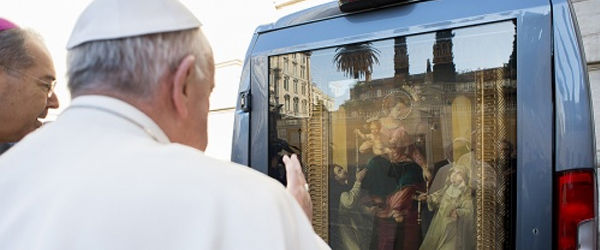Appropriately for a Lenten Friday, John Allen began his Feb. 22 Religious Education Congress workshop in the Anaheim Convention Center Arena with a confession.“I am stunned though thrilled that I am with you today,” smiled the senior Vatican correspondent for CNN, “when every molecule of my being is screaming that I need to be in Rome.”The announcement of Pope Benedict XVI’s resignation 11 days earlier forced Allen, who admitted he was as surprised as everyone else, to change his topic from “The Battle for Religious Freedom in the 21st Century” to “Conclave 101.” In his talk, he addressed four key questions:—What is the real story behind Benedict XVI’s resignation? “I do not believe there was some sudden health crisis,” Allen stated. “The man is not on death’s door. But he is aging and not young.”—How does the resignation shape the politics and dynamics leading into the coming conclave? Pope Benedict, Allen said, “has separated his end of life from the end of his papacy. This has changed everything and perhaps for the good.” It may be a longer conclave, he added, with more time looking for someone to meet the needs of the Church.—What are the cardinals seemingly looking for? The cardinals doing the electing — chosen by either John Paul II or Benedict XVI — seem to have three things they are looking for, Allen stressed, including “a broad global vision. By mid-century, three out of every four Catholics will live outside the developed world. The cardinals want a pope who can sustain that emphasis and can focus outside the West.”It also is clear, he continued, that “they want a pope who is an evangelizer — and with a common touch.” And, they want someone who is a bit more of a governor, a business manager, who can enforce a thorough reform of the Roman Curia.—Who is the next Pope going to be? There is “no obvious front-runner,” said Allen. At the April 2005 conclave, as a result of his role in the handling of affairs at Pope John Paul II’s funeral, and as the Dean of the Cardinals opening the conclave, Cardinal Joseph Ratzinger became an immediate front-runner. Just four ballots were needed for his selection, the last a mere “formality.”“It is harder to organize conversation now,” Allen said, noting that, “at Roman dinner tables,” the front-runners include the following:—Cardinal Angelo Scola of Milan, “a genuine scholar with a common touch.”—Cardinal Marc Oiullet of Montreal, “one of the most deeply spiritual, prayerful men, with a brilliant mind, a Sulpician priest with credentials from stints in Latin America.”—Cardinal Leonardo Sandri, Argentinian (by birth), but almost all of his adult life has been spent in Italy. “Most think of him as Italian,” said Allen, adding that Cardinal Sandri also served in Nigeria, Venezuela and in the Vatican Embassy to the U.S.—Cardinal Gianfranco Ravasi, Milan-born and currently head of the Pontifical Council for Culture, “an intellectual, who has a popular touch, a Biblical scholar by training, with a special feel for the churches in the Middle East.”—Cardinal Peter Erdo of Budapest, who “enjoys enormous respect, is often seen to run a tight ship and is better behind the scenes. He is known as a king-maker and could build a coalition.”With regard to the selection of an American, Allen said, “It is not very plausible, nor likely to happen — a real long shot.” The most possible would be Cardinal Timothy Dolan of New York (seen as “a bit of fresh air”) and Cardinal Sean O’Malley of Boston (seen as “a reformer, especially over the sex abuse crisis,” and also seen as “warm and caring, and because of that is not seen as able to reform what needs to change in Rome”).At the close of his presentation, Allen warned his audience: “Resist the conspiracy theories. Just don’t believe everything you hear.”{gallery width=100 height=100}gallery/2013/0308/congallen/{/gallery}

